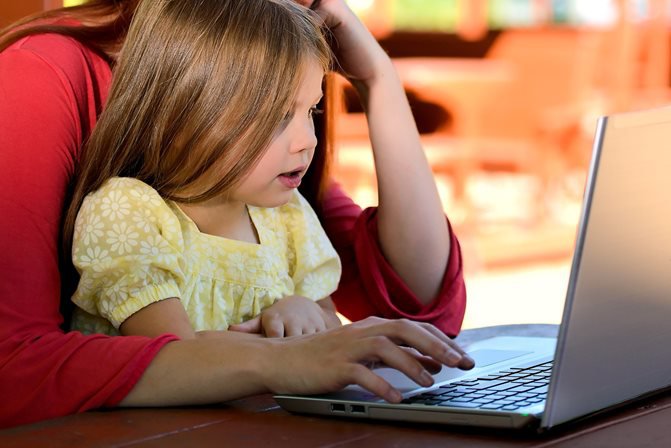Let's talk about tech
It’s the holidays; bed times get later, screen times get longer, and we sometimes worry more about what children are seeing and doing online. It can be daunting for older generations to talk about concerns about online behaviour, as they do not want to seem out of touch with technology. However, dialogue is the most important thing when it comes to dealing with issues around how your child uses the internet.
If adults are generally negative about young people’s use of technology, and get easily annoyed with various aspects of it in daily life, children are unlikely to tell them when something bad happens – they think they will fly off the rails, get angry, blame the technology and take it away. It’s important to remember that technology is not the problem, it's how we use it and the behaviours that stem from it that can be problematic.
It’s understandable for parents to panic and get scared when they hear about online risks, but to young people this can translate as anger, which is why we need to be careful about the ways in which we act and react towards the online world, both in everyday life and when something bad has happened.
Children that were groomed online were asked why they didn’t tell their parents while it was happening, and two responses emerged:
- Children didn’t want the technology to be taken away, and
- they were worried about parents reacting badly.
Clearly, barriers need to be brought down regarding these issues.
Show an interest
Parents and carers are the best people for your children to talk to about their concerns regarding the online world. Kids may know more about the technology, but adults are the ones with life experience; we have encountered unpleasant people and know how to deal with negative situations and navigate risks, and this is applicable to online situations as well.
There are lots of ways to talk about young people’s online activities. The best way to start is to ask questions about the platforms they use, whether it’s a particular game, social media site, or just what they enjoy doing online generally. Getting involved makes a big difference, and setting some time aside to sit with your children while they are online means you can ask questions and get more of an understanding of what they are doing, such as the objectives of a game they are playing.
You can ask them about how they stay safe online – try to listen without interruption, and don’t be judgemental. Ask about specific concerns, such as what they would do if someone they don’t know starts speaking to them through games or websites, and whether they know what to do and who to talk to if they need support. With either games or websites, fully understanding the platforms is not necessary – this is normal parenting, just under different circumstances.
Just show an interest, and don’t come across as against gaming or the online world, but rather be positive about it. If your child feels they can talk openly to you about concerns they have online, and willingly tells you if someone or something online has made them feel upset, you have succeeded.
Other things to try
Think about your own uses of the internet. This is really important because children mimic parents’ behaviour in many ways as they grow up, and model their behaviour – if you spend a lot of time on screens, young people will notice this and are more likely to follow suit. Question whether you could spend more time away from screens, and doing more offline activities together instead.
Implement filtering but tell your child so that they don’t feel deceived. K9 is good for this – with this tool you can block sites, put on time limits, set site exceptions and safe searches, and more. BT, Sky, Virgin and TalkTalk also provide filtering, and there is a wealth of knowledge regarding this and other advice at InternetMatters.org. Common Sense Media is also a great tool.
- Join apps together, and potentially have shared passwords for various platforms, depending on their age. Some providers also offer family sharing mechanisms, to do various services together; with Apple you can share iTunes, photo albums and help locate each others’ devices, at https://support.apple.com/en-gb/HT201060. Both for shared and private apps, check whether passwords are strong enough, and usernames don’t reveal full names.
- Learn the basics about an app, game or site, to give yourself a better understanding of the potential risks. Also find out how to report and block people, and find privacy settings, and you can use this and contact a site directly if something goes wrong.
- Encouraging kids to help friends or family with their online safety will drive them to stick to their own advice to stay safe. Find out if they have any tips for you, and ask whether their friends could benefit from their advice and support.
- Educate yourself about the minimum ages for various games, websites, apps and social media platforms. You can find this information in the privacy statement, which will describe their particular approach to children. Many social media platforms are only for people aged 13 and over, but policing this can be difficult, so parents play a really important role.
- See SWGfL’s range of online safety information and resources available to download, including including ‘Online Safety Guidance for Parents,’ checklists on how to stay safe on various social media platforms, and ‘Young People and Screentime,’ at www.swgfl.org.uk/products-services/online-safety/resources/
Family agreements
Having a family agreement can help to ensure that parents, as well as children, are open-minded about changing their online behaviour. You can put together a list of actions for individual people, and this can help with screen times as well as concerns about safety. Some examples of questions could be:
- What is acceptable behaviour, when it comes to strangers online, downloading questionable content or visiting certain types of sites?
- Do we have parental controls on computers and games, and how often will these be changed as the children grow up?
- How long can we spend online? What can we do together the rest of the time, offline? Are the two things well balanced?
- Do I know when it is acceptable to post photos of the children or other family members? Agree not to do this without their permission.
As you create the agreement, reflect on your tone, to ensure it remains positive. You can find a template family agreement here: www.saferinternet.org.uk/advice-centre/parents-and-carers/resources-parents-and-carers
Young people inherently tend to take risks and push their luck as they learn. You know how mature your child is and what they are resilient enough to see. Online there is always an element of risk and this will not stop kids from gaming, using the internet or seeing upsetting things.
Our role as adults is to be there for them, and to talk to them about what they are doing online, so that they can understand these risks and build the resilience they need as they grow up. If you connect with them about their safety, they are more likely to come to you when there is a problem.






